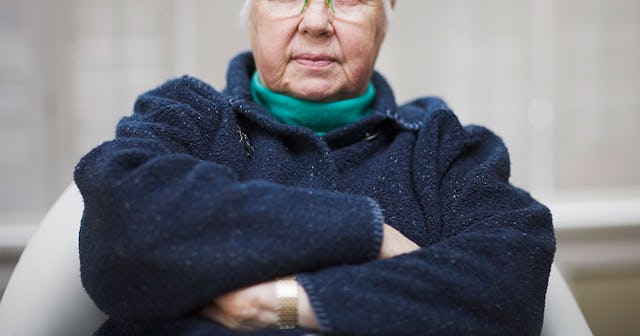My Mother-In-Law Has Never Accepted My Adopted Sons

Kudos to my mother. My sons are the two youngest of her 21 grandchildren — and I’ve never sniffed any discrepancy in how she treats any of her brood. If my mom forgets to send one a $25.17 birthday check (she thinks it’s funny to tack a random number of cents onto the gift amount) in their birthday card, she makes sure to add a note to all the grandchildren’s cards for the rest of the year. She will write something on the bottom like: “I forgot to give Frannie a little cash for her birthday, so you get nothing either! Better luck next year!” She thinks she’s hilarious — and they do too. I know that if my dad lived to meet his youngest two grandsons, he would be in on the hijinks. Like my mother, he would have never seen my two as different than their cousins. It would have never mattered that they are adopted.
On the other hand … it’s easy to see that it’s always mattered to my mother-in-law. She has obvious favorites — and I can say, without a doubt in my mind, that my boys have never made it into the top seven. And there are only nine grandchildren in total.
My mother-in-law is a bit of a narcissist and she feeds off the admiration of others. In her adult world, she peacocks her Louis Vuitton and Mercedes; in the world of her grandchildren, she awes with trips to Disney and real-china tea parties and over-the-top ice cream dates.
My sons are not impressed. What they crave is a grandparent who is interested in (or acts interested in) the things they are. Like squishing grubs and seeing how many tennis balls they can get stuck in our rain gutters. My mother-in-law has spent years interrupting my sons when they try to tell her about finding rusty, ancient bolts or some other grubby exploit — and she does this by reminding them of their cousins’ academic successes and athletic trophies. Those are things that this side of the family prizes. In her mind, my kids aren’t really full-fledged family members. She makes thinly veiled jabs about how different they are from the others.
“Must be because they’re adopted,” she winks. As if she’s making a joke.
I missed some clues that she wouldn’t welcome my adopted kids with open arms. Years before my sons came from Korea, a couple in town adopted a daughter from China. My mother-in-law thought their decision was selfish; why in the world would they do this to their parents? The child wouldn’t even look like the rest of them, she said. If they were going to embarrass their family, why not at least get a child that had eyes and skin like them?
That thinking very predictably oozed in our direction when we decided to adopt. The fact we were building our family in this “non-traditional” way was hush-hush, and any references to adoption were swallowed up by my mother-in-law’s loud, diversionary banter. It was almost like she thought we were unleashing family skeletons, on par with Uncle Frank’s extramarital dalliances or my stepbrother’s embezzlement snafu. A discussion involving adopted children was taboo, too; you did not mention this information in polite society, or even in front of your own family. Of course, my mother-in-law never said this aloud. She didn’t have to.
Why did I ever think that things would — or even could — change? She had years to warm to the idea of her new grandsons before they actually came home, and I thought it might be easy for her to attach the second she saw their beautiful pudginess and twinkling eyes. But it wasn’t love at first sight; they were interlopers before they were even conceived.
“I love all my grandchildren equally,” my mother-in-law will boast. But what’s under the Christmas tree each year tells a different story. The other three grandsons routinely get winter coats, not always the same style but always the same color. They think it’s a silly tradition — but, as a tradition, it says something about solidarity and familial connection. Most years, the three oldest score a pricey parka or down jacket. But most Christmases, the stores don’t seem to carry the chosen color in my boys’ sizes. So they will each be given a whatever-colored, old-man sweater vest, a present that spends the year in a drawer before it goes to the Salvation Army.
I never thought I’d see the day, but my sons (in spite of being adopted!) finally seem to have moved up in the rankings. But that’s mostly because all the other grandchildren have moved away. At my oldest’s high school graduation party, my mother-in-law gave him a big hug. And then she said, with sincere tears in her eyes, “I’m so glad you became part of our family.”
My husband thought the sentiment was sweet. I did not. My immediate thought was “Welp, too little too late, lady.” But, it was really “became” that raised my hackles. She could have said “I’m so glad you are part of our family” — which is what she would have said to all her non-adopted grandchildren.
That particular word choice conveyed two things: that she never stopped thinking of her grandson as “adopted,” a sort of outsider who we had been, almost conditionally, invited into our family; and that, with the passage of time, she had truly come to fully accept him, adopted or not.
And, in that moment, it became crystal clear that the second part isn’t even true.
This article was originally published on